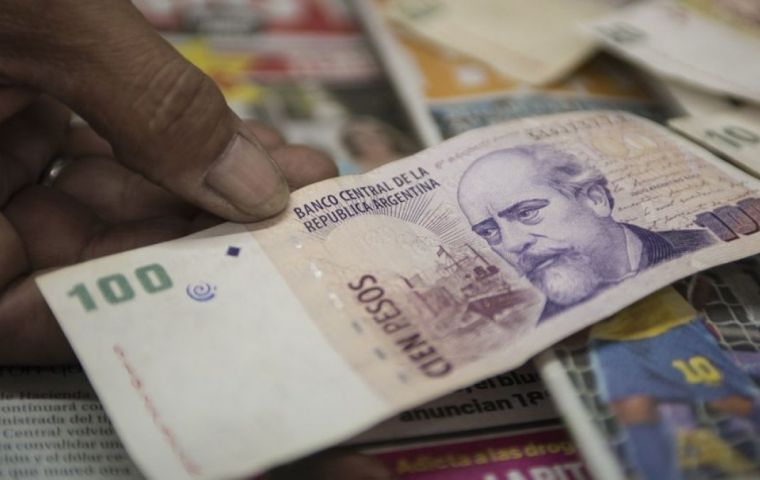MercoPress. South Atlantic News Agency
A week of volatility in Argentina ends with the Peso down 8.81%
 The turmoil has raised the heat on Macri after a week in which domestic media ran blanket coverage about a renewed crisis, threatening to derail his reelection plans
The turmoil has raised the heat on Macri after a week in which domestic media ran blanket coverage about a renewed crisis, threatening to derail his reelection plans Argentina’s peso fell back on Friday afternoon to post a record low close, giving up earlier gains after a tumultuous week that saw the currency battered to its weakest ever level and local debt pummeled as anxious investors fled.
The peso closed at 45.95 to the dollar, down around 1.85% on the day though still up on Thursday’s intraday low of 46.5. Markets had been somewhat salved by official interventions in the market and higher interest rates on short-term “Leliq” notes, they said.
Argentine bonds and the peso have been hammered this week as uncertainty over a biting recession and high inflation frayed investor nerves about political upheaval in Latin America’s No. 3 economy ahead of elections in October.
“Investors will remain worried until you see the elections happen. Unfortunately that’s a recipe for further volatility,” said Ilya Gofshteyn, New York-based senior emerging markets strategist at Standard Chartered Bank.
He said President Mauricio Macri still had a decent chance of re-election, the country was in better shape than in the past to counter the crisis, and that inflation should gradually slow. However, investors would demand high returns to stay in the market given the risks, he added.
The yield of Argentine government bonds due in 2021 have shot up above 18% and credit default swaps (CDS) of Argentine five-year debt rose to 1,229.25 points, a reflection of a rising chance of default.
The turmoil has raised the heat on Macri after a week in which domestic media ran blanket coverage about a renewed crisis, threatening to derail his plans for re-election and bolstering his political rivals.
The recession-hit country spiraled into a currency crisis last year that forced Macri to take a US$56 billion credit line from the International Monetary Fund. In 2018 the peso lost half its value against the dollar and inflation was close to 50%.
The peso fell 2.48% on Thursday after a 3.53% slide the day before. It was down 8.81% for the week.
Most economists said the market turmoil had been linked to a poll earlier in the week that suggested Macri’s arch rival, populist ex-President Cristina Fernandez de Kirchner, could beat the pro-market leader in an election run-off.
Macri defended the government’s economic reforms on Thursday, saying they had established an independent central bank and a balanced budget. He added change took time and volatility was to be expected.
“The markets are different, they are guys who are behind a computer in a faraway place, who buy, sell and have a short-term, opportunistic vision,” he said in comments made to local radio and circulated by his office.
“There is a huge majority of Argentines who do not want to go backwards and who want to go into the future.”
Macri’s fortunes are likely to rest on what happens in the economy in coming months, including whether he is successful in bringing down inflation that was 4.7% in March and is running at a 12-month rate of close to 55% driving investors out of the peso.
Morgan Stanley said in a research note it thought the market price of the peso was “too pessimistic,” but it preferred to “wait on the sidelines” given the stubbornly high inflation and hard-to-call election race.
That may leave little upside for the peso.
“With inflation continuing to rise and the domestic economy still suffering it is hard to paint a picture where ARS (Argentine peso) rallies significantly,” Rabobank strategist Christian Lawrence said in written comments.
“The elections are of course key but there are concerns that Macri is essentially trying to fight ‘kirch with kirch’ by adopting populist policies in an attempt to woo voters tempted to return to the days of pre-Macri.”




Top Comments
Disclaimer & comment rules-

-

-

Read all commentsIn summary: President Mauricio Macri took office three and a half years ago promising to forge ahead and never return to the policies of “the last 70 years” in a country whose citizens “do not want to go backwards,” according to Macri.
Apr 28th, 2019 - 01:06 am 0However, when his “market friendly” approach takes water from all sides, Macri turns to a return to the most “populist” measures implemented by the “populist” government of Cristina Fernandez de Kirchner.
Unfortunately, this abrupt change reveals a government that has lost all sense of direction -- if it ever had one.
What Macri does then? Guess what...blame the market, that's what.
The market, according to Macri, is “guys who are behind a computer in a faraway place, who buy, sell and have a short-term, opportunistic vision...” (And the statement continues as reported by other media): “...who do not know about our determination not to change direction.”
Of course, Macri's incredibly shallow statements show a president at a total loss, as friends begin taking healthy distance, scandals such as that surfaced about Marcelo D'Alessio and Ernesto Stornelli balloon, and vote intentions vanish with each passing day.
A sad end to the first Argentine elected government's attempt to install a neo-liberal economic program.
The Spectre of KFC rising from the grave is obviously spooking the markets!
Apr 28th, 2019 - 09:00 am 0Indeed. The Spectre of thousands of chickens slaughtered by Kentucky Fried Chicken (KFC) it's more than any market in the world may be able to withstand!
Apr 28th, 2019 - 04:07 pm 0Commenting for this story is now closed.
If you have a Facebook account, become a fan and comment on our Facebook Page!